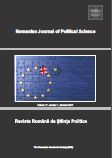Moderate Salafism and the Challenge of De-Radicalization. The Case of Pakistan
Moderate Salafism and the Challenge of De-Radicalization. The Case of Pakistan
Author(s): Husnul AminSubject(s): Politics, Theology and Religion, Islam studies, Security and defense
Published by: Societatea Academică Română (SAR)
Keywords: Moderate Salafism; Multiple Salafism; De-radicalization; Ahle Hadith; Moderate Islam;
Summary/Abstract: It is generally taken for granted that Salafism is inherently a violent ideology and social-political trajectory. Seen as a globally homogenous phenomenon, the possibility of a moderate trend within Salafism is generally ruled out. Consequently, adherents of the Salafi ideology are not seen as part of the solution to tackling extremism and radicalism. The current research paper brings this widely held belief into question from several grounds. It does so by identifying the prevalence of diversity rather than homogeneity in the Salafist social trajectory in Pakistan and beyond. Further, the research more specifically highlights the body of moderate Salafi activists and their social networks promoting an alternative worldview to those of violent extremists. Moreover, the research suggests ways and means of broader social engagement of moderate Salafists as partners in peace building, violence prevention and the further strengthening of the current de-radicalization programs in Pakistan. The prevalence of multiple strands of Salafism (rather than singular/homogenous) offers an opportunity, and may therefore be (re)conceptualized as part of the solution of the most daunting challenge Pakistan is confronted with. The argument made here further strengthens the stream of studies conducted on inclusion-moderation hypothesis (tested for various Islamist movements across the globe). Through their inclusion in the de-radicalization process, the Salafists will not only further moderate their radical positions but will also contribute to the intellectual and social resources needed for the de-radicalization project. The research therefore suggests that policy makers and implementers may look beyond the Salafi textual surface and militant-Salafist variety, and concentrate on competing social-political practices.
Journal: Romanian Journal of Political Sciences
- Issue Year: 17/2017
- Issue No: 1
- Page Range: 62-90
- Page Count: 29
- Language: English
- Content File-PDF

